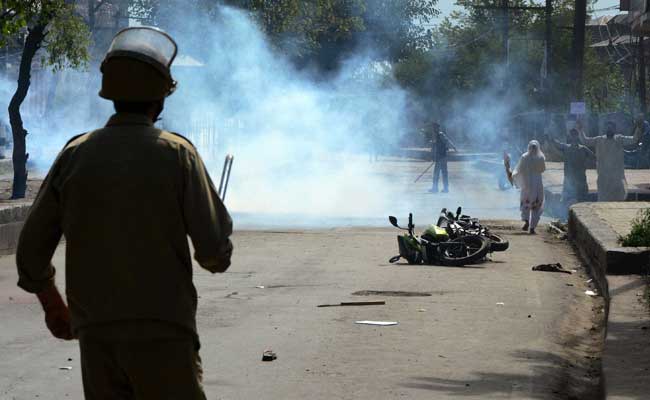GK Pillai said if forces don't have an alternative, they will have to use normal bullets.
- It was decided to use pellet guns after 2010 agitation, GK Pillai said
- They were considered a safer alternative
- The number of deaths this time is 40% less, he said
Did our AI summary help?
Let us know.
New Delhi:
On a day Union Home Minister Rajnath Singh said pellet guns -- responsible for the deaths and injuries in Kashmir valley -- will soon be replaced, former Union Home Secretary GK Pillai, who handled the 2010 agitation, said the decision to use pellet guns has been vindicated.
Blaming only Pakistan for the unrest is counterproductive, he further added.
The idea behind using pellet guns was to use "non-lethal weapons" as much as possible, Mr Pillai said.
"In 2010, more than 100 people died. Today, even after 48 days of agitation, around 60 have been killed. There is a drop of about 40 per cent in the casualties," he said.
Pellet guns have been used when the police have been under attack in the valley - in which more than 5000 people have been injured.
 Around 100 people have lost their vision. As the number of casualties grew, the security forces have been accused of using excessive force and the government ordered minimum use of pellet guns.
Around 100 people have lost their vision. As the number of casualties grew, the security forces have been accused of using excessive force and the government ordered minimum use of pellet guns.
While the Home minister is yet to suggest an alternative to pellet guns, Mr Pillai said if the forces don't have an alternative, they will have to use normal bullets, and "there will be casualties".
Supporting "substantive dialogue" with all sections in Kashmir, Mr Pillai said, the current "political initiative" should have come earlier.
He said the 2010 initiative -- when the Centre appointed interlocutors -- should have been carried forward and some of the recommendations made by the interlocutors could have been implemented.
The former home secretary also said Pakistan cannot be blamed for everything. "There is an underlying sentiment in Kashmir that needs to be addressed.
Any dialogue, he said, has to be based on sound local governance, where people have a stake. In this context, he said former chief minister Omar Abdullah is responsible for the current unrest, letting slip the edge gained after the successful Panchayat elections in the state in 2012.
Mr Adbullah, he said, should have been "statesman" enough and devolved "administrative and financial powers," allowing for the growth of local institutions and participation of locals in the process of development.
Blaming only Pakistan for the unrest is counterproductive, he further added.
The idea behind using pellet guns was to use "non-lethal weapons" as much as possible, Mr Pillai said.
"In 2010, more than 100 people died. Today, even after 48 days of agitation, around 60 have been killed. There is a drop of about 40 per cent in the casualties," he said.
Pellet guns have been used when the police have been under attack in the valley - in which more than 5000 people have been injured.

More than 60 people have died and 5,000 injured by pellet guns in Kashmir.
While the Home minister is yet to suggest an alternative to pellet guns, Mr Pillai said if the forces don't have an alternative, they will have to use normal bullets, and "there will be casualties".
Supporting "substantive dialogue" with all sections in Kashmir, Mr Pillai said, the current "political initiative" should have come earlier.
He said the 2010 initiative -- when the Centre appointed interlocutors -- should have been carried forward and some of the recommendations made by the interlocutors could have been implemented.
The former home secretary also said Pakistan cannot be blamed for everything. "There is an underlying sentiment in Kashmir that needs to be addressed.
Any dialogue, he said, has to be based on sound local governance, where people have a stake. In this context, he said former chief minister Omar Abdullah is responsible for the current unrest, letting slip the edge gained after the successful Panchayat elections in the state in 2012.
Mr Adbullah, he said, should have been "statesman" enough and devolved "administrative and financial powers," allowing for the growth of local institutions and participation of locals in the process of development.
Track Latest News Live on NDTV.com and get news updates from India and around the world

